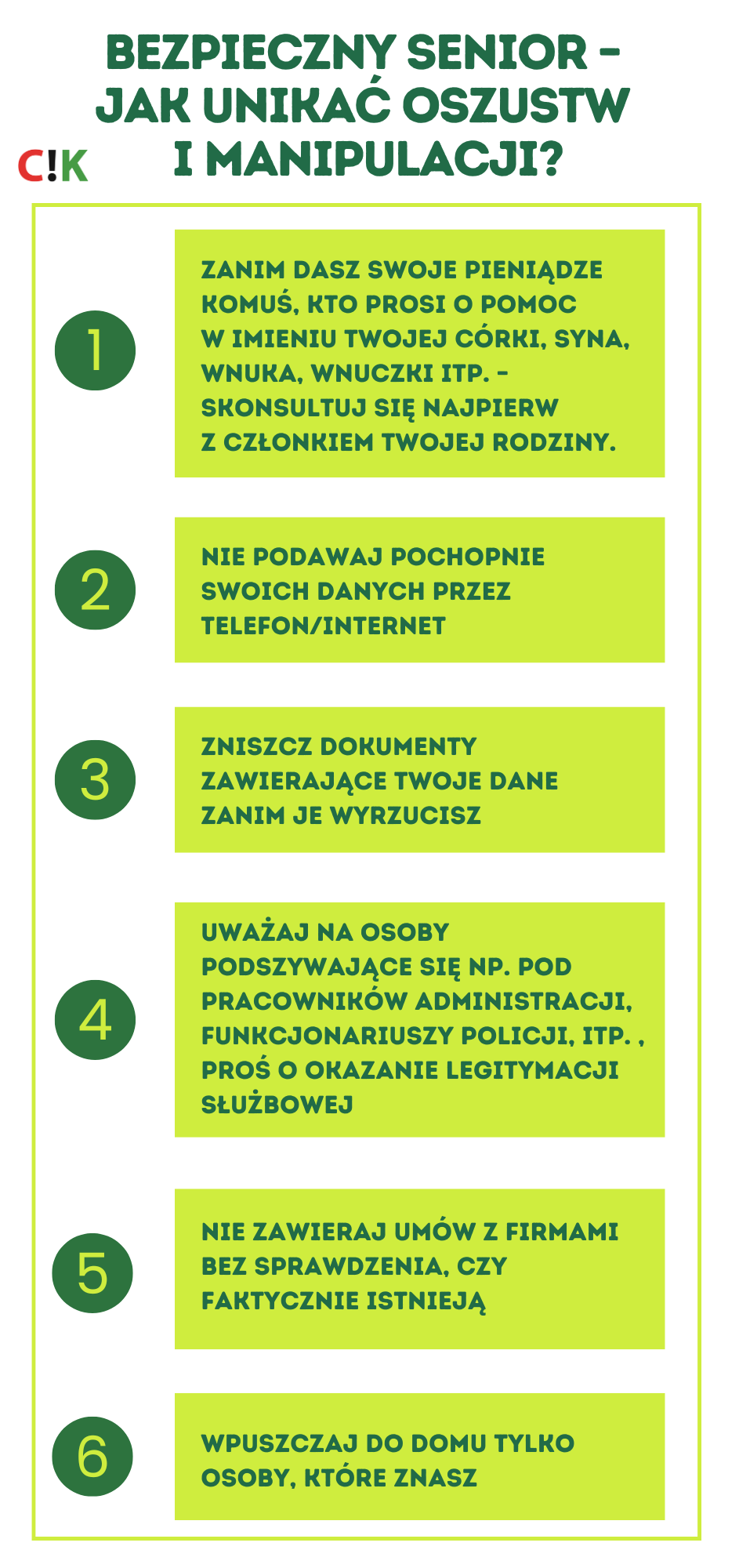Today, between 9:00 and 11:00 a.m., an information meeting will be held at the premises of the Crisis Intervention Centre at 6A Probostwo St. on the offer of the CIK, aimed at people who run activities for older people, e.g. senior citizens’ clubs, ZOW, Universities of the Third Age.
You are warmly invited to attend. The meeting is organised as part of the Lublin Senior Citizens’ Days.
This year’s Lublin Senior Citizens’ Days are slowly coming to an end. Instead, another important day is approaching – World Elderly Rights Day, celebrated annually on 15 June. The aim of this day is to raise awareness of the problems faced by older people and to draw attention to the need to respect their dignity and rights.
Today, we would like to draw attention to the problem of various types of scams that affect senior citizens and how they can be avoided.
Safe senior – how to avoid scams and manipulation?
Before giving your money to someone asking for help on behalf of your daughter, son, grandson, granddaughter etc. – consult a member of your family first.
‘Grandchild’, “friend” and “pity” offences:
- „granchild”
- „pity”
- ”friend”
Do not hastily give out your data over the phone/internet
- Apply – especially on the internet – the principle of limited trust. Be careful what you say about yourself. Don’t rashly share personal information with unknown people or entities. Don’t be afraid to ask who they are, what entitles them to obtain your data, why they are collecting it.
- Avoid publishing photos of your documents, do not pledge your ID card, and when a person or institution asks you to copy your ID card – ask for the legal basis. Only in certain situations is this exceptionally permissible, when regulations allow it. Some institutions can copy our documents e.g. banks. However, they should only do this in exceptional situations and not on every occasion. Furthermore, an employee of such an institution should give us a reason and a legal basis.
- Don’t give data over the phone when you are not sure it is necessary.
- When filling in the form, before you tick all the consents, make sure what they relate to.
Destroy documents containing your data before you throw them away
Beware of people impersonating e.g. administration staff, police officers, etc., ask to see their official ID card
Do not enter into contracts with companies without checking that they actually exist
Only allow people you know into your home
Keep: distance, caution and vigilance. Before you open the door:
- Look through the peephole in the door or out the window – who is it?
- If you don’t know the visitor – ask about the purpose of their visit, fasten the security chain (if you decide to open the door) and ask to see your ID or business card. Your caution and distrust will not alienate an honest person. Check your documents carefully.
- If in doubt, make an appointment for another time, checking the credibility of the visitor with the estate administration or relevant institution beforehand.
- If the visitor becomes insistent, call the police or alert the neighbourhood. Try to remember as many details as possible, e.g. the appearance of the stranger, the numbers and make of the car they may have arrived in.
- If you have to let someone in, do not leave them alone in the flat for a while, preferably accompanied by neighbours.
While at home, follow the basic rules:
- Do not conduct any transactions with door-to-door canvassers or collectors.
- Do not store large sums of money or valuables in the flat, especially in the so-called typical places (kitchen cupboards, laundry room, bar, etc.).
- If you keep money at home, hide it in a place that is difficult to access. Don’t tell anyone what day you receive your pension, how much you have in savings or where you store it. These are just a selection of situations that can happen to you. The ingenuity of criminals knows no bounds. In such cases, contact the police immediately by calling the emergency number 997 or 112. You can always pass on your comments and observations to your district officer.
https://uodo.gov.pl/pl/138/3414?fbclid=IwZXh0bgNhZW0CMTAAAR6MjxyJLM60hcw6TmK7tlgOsuJQG1eIeUgoJ9PzPT8DnOVHGBPDye4IH8aqTw_aem_AFvJWvWkN_pUrQOHtXhVuw access 06.06.2025

